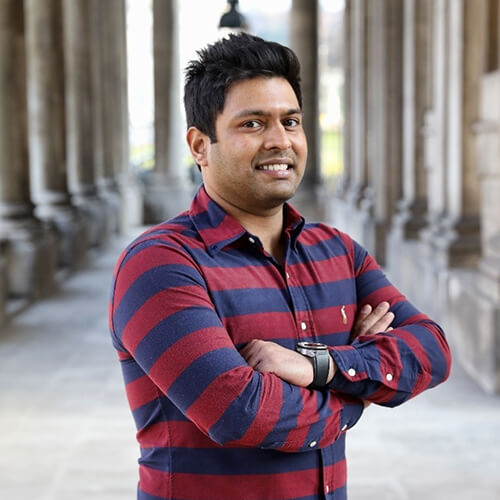
A vision that started at Greenwich
The world’s first micro-domestic air conditioning system that can be attached to any fan and runs on solar power – this is the revolutionary invention of Dinul Wijetunge, final year BEng Hons Mechanical Engineering student at the University of Greenwich.
The project began as Dinul’s vision for his final year project as part of his course. He intended to create a fan that works as an air conditioning system, but he realised he could turn any fan in the world into an air conditioning system with the right product.
Dinul had big ambitions for the project, and he decided to enter it into the university’s Enterprise Challenge, run by the Generator hub. His pursuit was successful – he was the proud winner of this year’s Engineers in Business Award 2022.
Joining the global fight against climate change
Dinul’s product will have big implications. It will be portable and affordable, and because it has no coolant, meaning there is no coolant leakage from the product, and because it can be used in developing countries, it has the potential to be a highly influential tool in the global fight against climate change.
Dinul is clear that he owes much of his success to the University of Greenwich. The idea was borne from the challenge of creating a final year project, and it was his success in the Enterprise Challenge that inspired him to continue endeavouring to showcase the product. The advisory board for the challenge consisted of two doctoral lecturers and two lecturers in engineering from the university. He says without them none of this would have been possible.
My experience at the University of Greenwich has been excellent. The work we complete as students makes us reassess our limits and how far we can go when it comes to creating tangible work like this.
Secure your future as an engineer
Dinul trained in composites manufacturing from a young age due to his family background. But through his studies at the University of Greenwich, he has been able to hone his technical skills and specialise in the areas of engineering that interest him, as well as develop his entrepreneurial skills through the opportunities presented to him. To top it all off, he will finish the course with his completed thesis and the qualification he needs to secure his future as an engineer.
Dinul always thinks ahead, and his next project and competition bid are already underway. The project is the world’s first robotic kitchen, an automatic eco-friendly machine that cooks and services food without human intervention. For this project, Dinul is a semi-finalist for the external Mayor’s Entrepreneur Competition, where he has the chance to win £20,000.
I entered the Enterprise Challenge and Mayor’s Entrepreneur Competition to seek the scale of market acceptance and the scope of market viability for products like these.
He concludes that he is just one man with one ambition – to improve our planet through innovation.
This article was originally published on 10/6/22.



